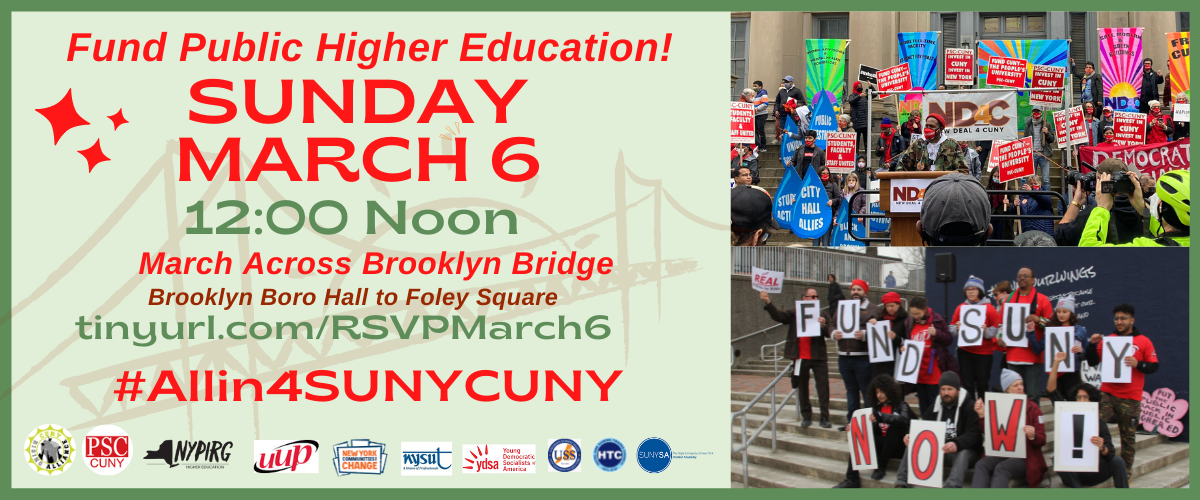The state of CUNY’s infrastructure can be ignored no longer. Tomorrow, students and faculty from all campuses will march across Brooklyn Bridge in a bid to bring awareness of neglect to members of the State Senate and Assembly. Joining them will be Dr. Lindsey Albracht of QC’s English department. The Knight News spoke to Albracht about the march and her participation therein.
What is your role in the march? Did you have a hand in organizing it? Or maybe you heard about it and decided to participate?
I heard about the march at a department meeting, but I didn’t have a hand in organizing it.
What’s your stake in all this? Why is this demonstration so important that so many would give up their weekend to march?
For decades, a lot of students, faculty, and staff have been fighting for the state to fully fund CUNY. Anyone who works or learns here is familiar with the literal and metaphorical cracks that disinvestment has created. The pandemic took some of those cracks and turned them into holes.
Just a couple of weeks ago, I stood at my classroom window in Kiely and watched hundreds of students freeze outside while they tried to gain access to campus. This was partly because of a lack of money that led to public safety staffing shortages. I went back to my 90-degree office where a jar of chocolate had melted on my desk. Klapper is notoriously overheated in the winter because it needs a lot of capital improvements.
Back at the office, I chatted with a few part-time colleagues who have to travel between two, three, and four other campuses to make ends meet so they can teach students in classrooms where class caps are sometimes double the recommended national average. Those students have shouldered the cost of tuition hikes. They’ve lost more and more access to academic advisors, mental health counselors, full-time library staff, and a million other things.
It doesn’t have to be this way. We’re asking for the most basic stuff. I shouldn’t have to teach in a classroom where I had to buy my own technology and bring my own dry erase markers. Our students shouldn’t have to learn in classrooms that are moldy, hot, inadequately ventilated, or leaking. We need a lot more full-time teaching and research positions for people who just want to earn enough money to do their job without needing to do six other jobs. Staff should not have caseloads of hundreds of students. And all of us should earn money for the work that we do: we cannot keep filling in all of these holes with our voluntary labor.
Would you happen to know whether QC is affected by infrastructure neglect in some unique way? Or is this just a show of solidarity with other CUNY colleges?
All of the things that I mentioned above are infrastructure issues. Infrastructure isn’t just about fixing buildings: it’s about being able to see an advisor, getting answers to questions about financial aid, getting access to mental health services, accessing classes that you need to graduate, and being able to study in staffed, quiet spaces when you need to use them.
I also think that QC is directly affected by crumbling CUNY infrastructure elsewhere. Working conditions at CUNY community colleges and at the other CUNY schools impact working conditions here at Queens in a very direct way, because our students move around the system. The CUNY system is interdependent. That’s part of the reason that it’s so important for us to show solidarity with other CUNY colleges.
If you could personally send a message to those who’ll be voting on the budget next week, what would it be?
Adequate investment in CUNY is not only an investment in the future of our city, it’s a key racial justice issue. We serve half a million majority Black and brown students from low-income and immigrant communities. Our students bring extraordinary linguistic, cultural, and community gifts to our classrooms and this makes everyone’s learning and teaching environment richer. They deserve the same access to a high-quality educational experience in buildings that are equipped for 21st century learning taught by adequately compensated faculty and supported by staff with manageable workloads that many of their peers in majority-white schools get.
Funding the #NewDeal4CUNY would help us make CUNY tuition free again, as it mostly was for over 100 years: from 1847 until 1976. It would guarantee faculty and staff-to-student ratios. It would help us make some other sorely needed infrastructure improvements. For the first time in a while, because of federal stimulus money, there’s a budget surplus. It’s way, way past time to give our students, faculty, and staff the CUNY we all deserve.
The Knight News thanks Prof. Albracht for her contribution to this article and her support for student activism. Those who wish to attend can RSVP using this link.











